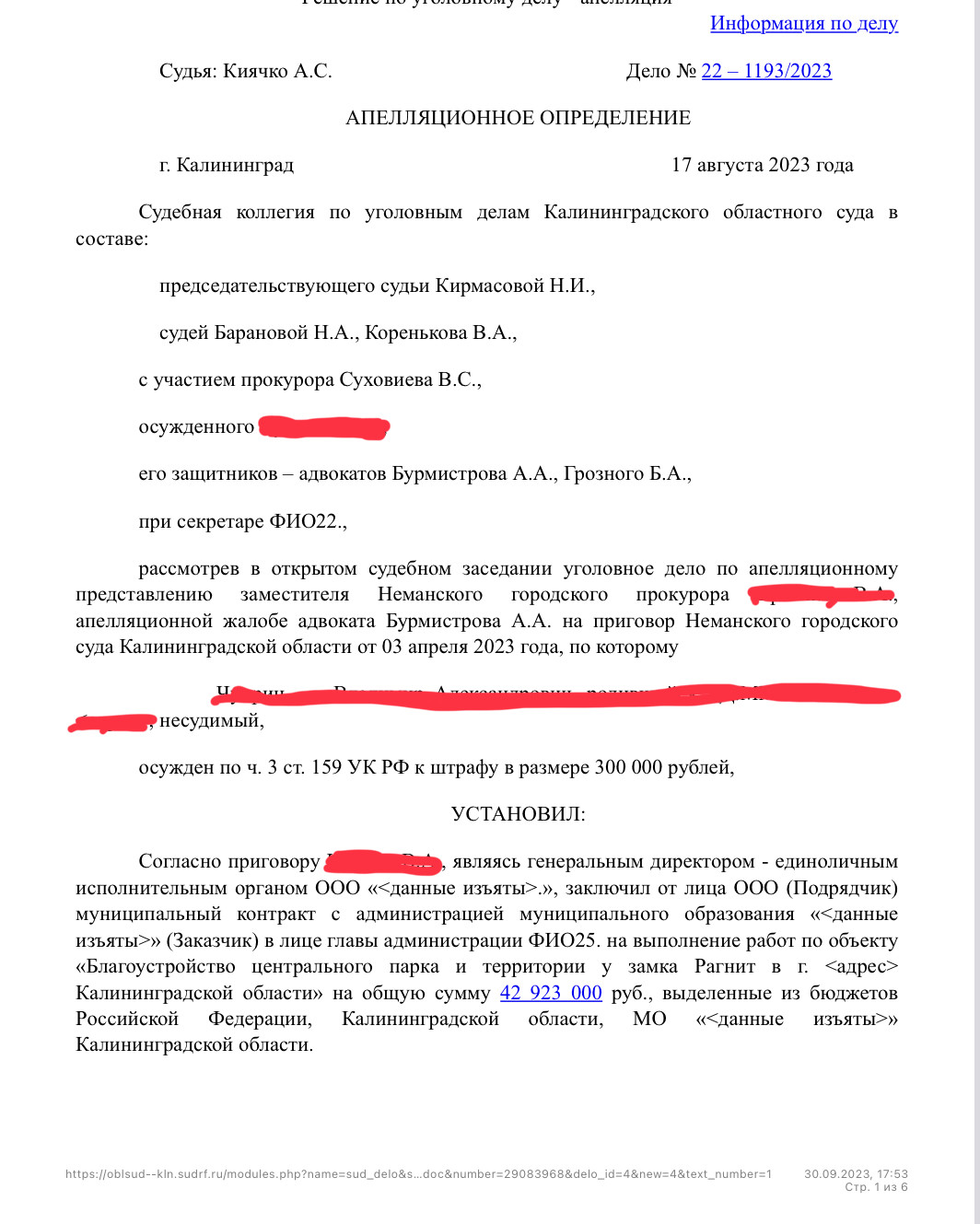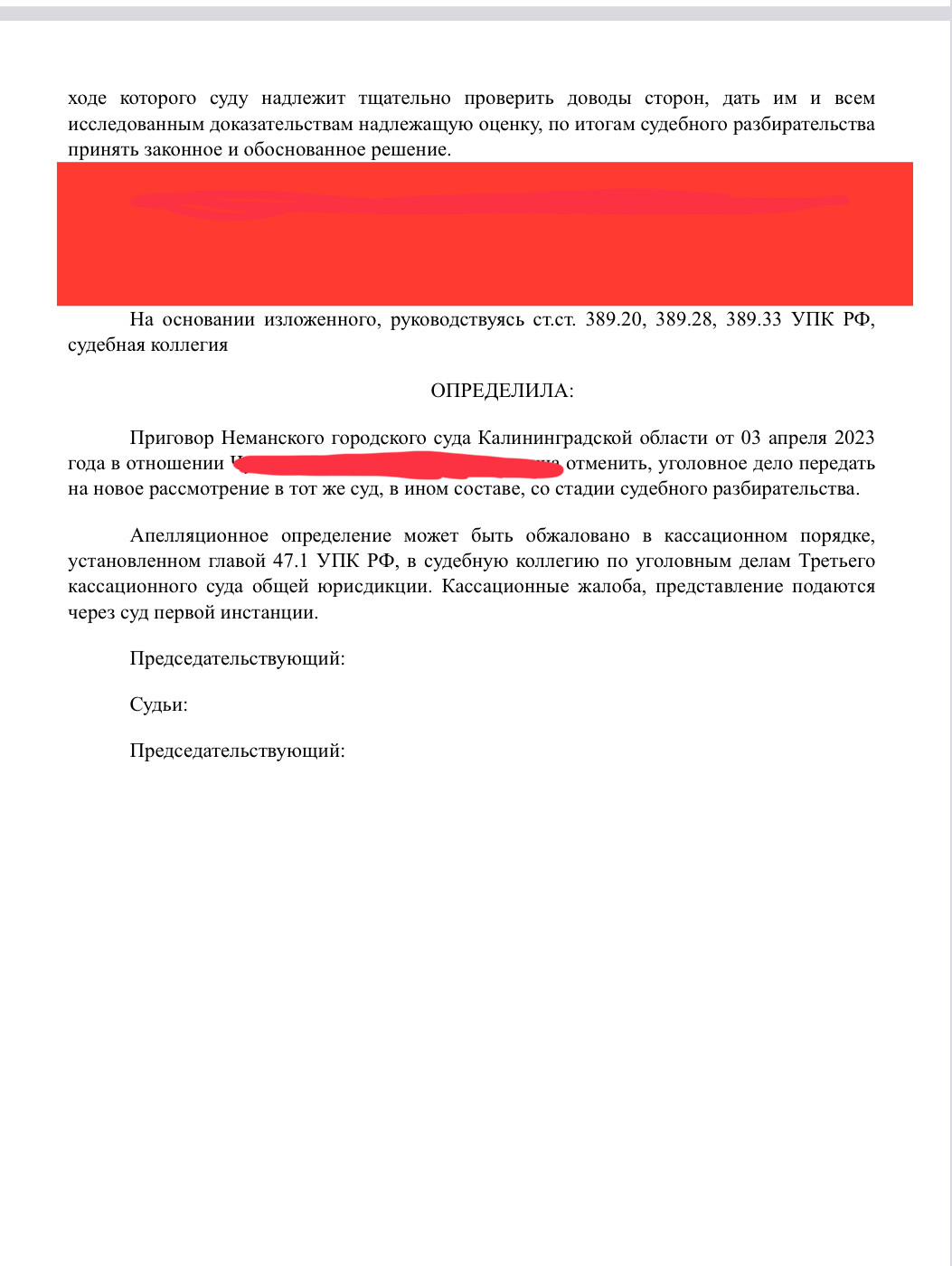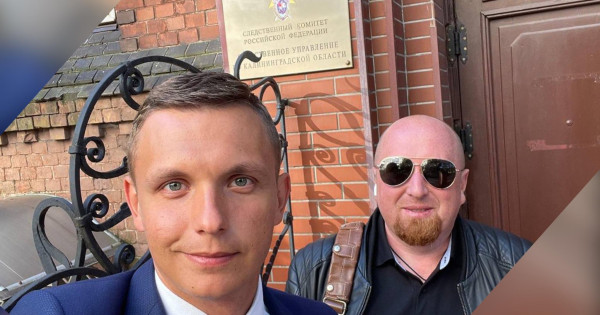The panel of judges overturned the verdict of OUR CLIENT under Part 3 of Art. 159 of the Criminal Code of the Russian Federation and the criminal case was transferred for a new trial in a different court composition
Part 3 of Article 159 of the Criminal Code of the Russian Federation provides that fraud committed by a person using his official position, as well as on a large scale, is punishable by a fine in the amount of one hundred thousand to five hundred thousand rubles or in the amount of the wages or other income of the convicted person for a period of one year. years to three years, or forced labor for a term of up to five years with or without restriction of freedom for a term of up to two years, or imprisonment for a term of up to six years with a fine in the amount of up to eighty thousand rubles or in the amount of wages or other income of the convicted person for a period of up to six months or without it and with restriction of freedom for a period of up to one and a half years or without it.
Having heard the speech of prosecutor V.S. Sukhoviev, who supported the arguments of the appeal, the speech of convict XXXXX, his defense attorneys Burmistrov A.A., Grozny B.A., who supported the arguments of the appeal, having studied the case materials, checking the arguments of the appeal and complaint, the judicial The panel finds the verdict subject to cancellation for the following reasons.
According to Part 2 of Art. 297 of the Code of Criminal Procedure of the Russian Federation, a court verdict is recognized as legal, reasonable and fair if it is based on the correct application of the criminal law and is decided in accordance with the requirements of the criminal procedure law.
In accordance with clause 1, clause 2 of Art. 389.15 of the Code of Criminal Procedure of the Russian Federation, the grounds for overturning a sentence on appeal are the discrepancy between the court’s conclusions set out in the sentence and the actual circumstances of the criminal case established by the court; significant violation of criminal procedure law.
According to the provisions of Art. 389.16 of the Code of Criminal Procedure of the Russian Federation, the verdict is recognized as not corresponding to the factual circumstances of the criminal case established by the court of first instance, if the court did not take into account circumstances that could significantly influence the court’s conclusions; the verdict does not indicate on what grounds, in the presence of contradictory evidence that is significant for the court’s conclusions, the court accepted some of this evidence and rejected others; the court's conclusions set out in the verdict contain significant contradictions that influenced or could influence the resolution of the issue of guilt or innocence of the convicted or acquitted person, the correct application of the criminal law or the determination of the penalty.
In accordance with Part 1 of Art. 389.17 of the Code of Criminal Procedure of the Russian Federation, significant violations of the criminal procedural law are those that, by depriving or limiting the rights of participants in criminal proceedings guaranteed by the Criminal Procedure Code of the Russian Federation, non-compliance with the legal procedure, or in any other way, influenced or could influence the adoption of a lawful and justified judicial decision.
In accordance with the requirements of Art. 307 of the Code of Criminal Procedure of the Russian Federation, the descriptive and motivational part of the guilty verdict must contain a description of the criminal act recognized by the court as proven, the evidence on which the court’s conclusions are based, and the reasons why the court, if there were contradictions in the evidence, accepted some evidence and rejected others.
In violation of the above provisions of the law, the verdict contains significant contradictions in the description of the circumstances recognized by the court as proven, and in the assessment of the evidence on which the court's conclusions are based.
Under theft, including fraud, according to paragraph 1 of the notes to Art. 158 of the Criminal Code of the Russian Federation refers to the unlawful gratuitous seizure and (or) circulation of someone else’s property in favor of the perpetrator or other persons committed for personal gain and causing damage to the owner or other holder of this property.
Within the meaning of Art. 159 of the Criminal Code of the Russian Federation and according to the explanations in paragraphs. 1-3 Resolution of the Plenum of the Supreme Court of the Russian Federation dated November 30, 2017 N 48 “On judicial practice in cases of fraud, misappropriation and embezzlement”, methods of theft in fraud are deception or breach of trust, under the influence of which the owner of the property or another person transfers the property or the right to it to another person or do not prevent the seizure of this property or the acquisition of the right to it by another person.
Deception may consist of deliberate communication (presentation) of knowingly false information that does not correspond to reality, or in silence about true facts, or in deliberate actions aimed at misleading the owner of property or another person.
Abuse of trust in fraud is the use for personal gain of a trust relationship with the owner of property or another person authorized to make decisions on the transfer of this property to third parties. Trust can be conditioned by various circumstances, for example, the official position of a person or his personal relationship with the victim.
Thus, having concluded that OUR CLIENT disposed of the funds at his own discretion, the court did not check the defense’s arguments that these funds, although they were received by LLC “<data taken>.” from the administration of the Moscow Region “<data taken>”, but were fully spent on work under the contract, that is, spent in the interests of the administration of the Moscow Region “<data taken>
In addition, the court indicated in the verdict that OUR CUSTOMER, submitting to the administration of the municipality an act in the form KS-2 No. 1.3 and a certificate in the form KS-3, which included untrue information about the costs “<data taken>.” for the purchase of paving stones, deliberately deceived and misled officials of the administration of the Moscow Region “<data taken>”, who, trusting OUR CLIENT by virtue of the authority of his position, relying on his reliability and integrity as a Contractor, being deceived and misled by him, signed Act No. 1.3 dated October 28, 2020, containing untrue information about the costs incurred by the Contractor for the purchase of paving stones in the amount of 361.43 sq.m., in the amount of 899,654 rubles.
At the same time, the court established that this paving stone was received by LLC “<data taken>.” from the administration of the Moscow Region "<data taken>".
The court's findings in this part contain significant contradictions.
Witness FULL NAME26 (deputy head of administration of the municipality “<data taken>”) explained to the court that she knew that paving stones belonging to the municipality were used during the work under the Contract; she signed the act of completed work in form KS-2 No. 1.3 dated October 28, 2020 , because it had already been signed by other persons; the accuracy of the information included in the act was not verified.
Witness FULL NAME27. (the foreman of LLC "<data taken>.") explained to the court that the deputy head of the administration of the municipality "<data taken>" FULL NAME 26., responsible for the execution of the Contract, personally informed him where to take the municipality's paving stones for the work.
The court did not check how OUR TRUSTEE deliberately misled officials of the administration of the Moscow Region "<data taken>" regarding the source of obtaining paving stones, if it was the administration that provided this paving stone to LLC "<data taken>.", of which the administration officials were aware.
The above circumstances, which could significantly influence the conclusions of the court when deciding the issue of guilt or innocence, the correct application of the criminal law, the determination of the penalty, were not clarified during the trial, the arguments of the defense to challenge the charges were not actually verified, the assessment of the examined evidence and the available in them the contradictions in the verdict are not given.
The violations of the criminal procedural law committed by the court of first instance limited the right of the accused to defense, significantly influenced the rendering of a lawful, reasonable and fair court decision, and cannot be eliminated in the court of appeal, and therefore, in accordance with the provisions of part 1 and 2 tbsp. 389.22 of the Code of Criminal Procedure of the Russian Federation, the verdict is subject to cancellation with the referral of the criminal case to the court of first instance for a new trial by a different composition from the stage of trial, during which the court must carefully check the arguments of the parties, give them and all examined evidence a proper assessment, based on the results of the trial, accept the legal and an informed decision.




